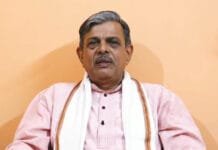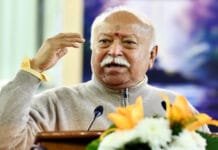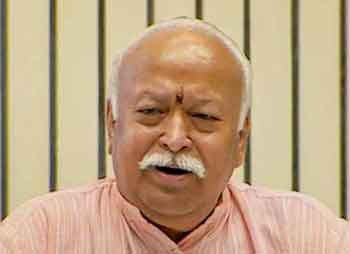In a deeply philosophical and nationalistic address, Rashtriya Swayamsevak Sangh (RSS) chief Mohan Bhagwat reminded the nation of the timeless Indian values of sacrifice, harmony, and self-discipline. Speaking at the Anuvrat Nyas Nidhi lecture organized at Indira Gandhi National Open University (IGNOU) in New Delhi, Bhagwat underlined a critical point: true religion cannot rise by diminishing another. His words come as a powerful reminder in an era increasingly plagued by polarization, spiritual commercialization, and materialist pursuits.
Harmony Over Hostility: The Foundation of Indian Spirituality
Bhagwat emphasized that India’s civilizational ethos has always been about building unity through diversity, not enforcing uniformity. “Your religion cannot survive if my religion is destroyed,” he declared, urging people to reflect deeply on the essence of coexistence. He reminded the audience that India is a land of many sects and traditions, yet no real internal conflict arises when the spirit of mutual respect is maintained.
The RSS chief stated unequivocally that no religion can flourish by harming another, underscoring that spiritual elevation must come through compassion, not confrontation. His statement came amid rising global tensions, where religious divisions often become fuel for sociopolitical agendas.
A Call to Rethink Historical Narratives
Bhagwat raised critical concerns regarding the distortion of historical education in India. He questioned why Western history is predominantly taught in Indian classrooms, while the world remains unaware of India’s rich historical legacy. “Now I am hearing that history is being changed in India as well,” he noted with cautious optimism, indicating a gradual shift in curricular perspective.
The Sangh chief argued for a more balanced and authentic representation of Indian civilization, one that doesn’t merely mimic foreign ideologies but stands firmly rooted in Bharat’s native wisdom. This sentiment reflects a growing demand to decolonize the Indian education system, a process Bhagwat suggests is long overdue.
Materialism and Modern Despair: A Crisis of Values
In one of the most poignant parts of his address, Bhagwat spoke about the increasing global divide between rich and poor, asserting that the current world order lacks a unifying spiritual compass. “People only value those who are useful to them. Once usefulness ends, so does respect,” he lamented.
He further criticized the modern life philosophy that promotes hedonism over humanity. “People think the goal of life is to enjoy until you die. This mindset is the root of sorrow in the world,” he remarked. Bhagwat called upon India to rise above materialistic paradigms and reclaim its spiritual leadership through values of sacrifice, empathy, and balance.
The Indian Ethos of Self-Sacrifice: The Story of the Pigeon and the King
To illustrate India’s innate spirit of protecting others even at personal cost, Bhagwat recalled a legend from Indian lore: A pigeon once sought refuge with a king to escape an eagle. Rather than handing over the pigeon, the king offered his own flesh equal in weight to the pigeon to the eagle.
“This is Indianness,” Bhagwat asserted. “The idea that we must protect others—even if it means sacrificing ourselves—has been embedded in our culture for thousands of years.” This metaphor of selflessness stood in stark contrast to the transactional and self-serving nature of modern international relations.
India’s Role in the World: A Beacon of Spiritual Wisdom
Mohan Bhagwat powerfully stated that India must remain India, not a pale imitation of the West. “We must be guided by our own nature, our own dharma,” he said. “If India has to exist, it must follow the path that is true to its soul.”
Bhagwat suggested that India’s future global leadership will not come through wealth or military might, but by offering the world a new spiritual vision. “The world looks to India not for domination but for direction,” he said. In his view, India’s message should be: do not seek to conquer others—conquer yourself.
This philosophy, he pointed out, is unique to Indian thought. “This kind of spiritual message—of self-mastery and inner victory—exists nowhere else in the world,” he claimed, emphasizing India’s capacity to provide moral and ethical solutions to global crises.
Reforming Society Starts with the Individual
In a deeply introspective note, Bhagwat emphasized the importance of personal conduct in building a harmonious society. “A family is built through the character of a single person,” he stated, urging citizens to correct their small habits and choices as the first step toward national transformation.
He reminded the audience that societal harmony does not come from policies alone, but from individual integrity, self-restraint, and dharmic living. “The future of India depends not just on governments, but on the daily actions of its people,” he asserted.
RSS’s Vision: A United, Self-Reliant, and Spiritually Strong India
While political overtones were subtle, Bhagwat’s lecture echoed the RSS’s broader mission: to strengthen India from within, by reconnecting with its civilizational roots. He called on the people to see religion not as a tool of identity politics but as a path of discipline, duty, and universal well-being.
He warned against the externalization of faith, urging individuals to look within and live religion through action, not just ritual. This inner revolution, he believes, is what India needs to lead the world not just economically or technologically, but ethically.
Conclusion: India’s Spiritual Voice Must Resonate Globally
Mohan Bhagwat’s speech was a clarion call for national introspection and global inspiration. By advocating for religious harmony, ethical education, and spiritual resurgence, he offered a roadmap for both internal stability and global relevance. His message is clear: a stronger India must not emerge by silencing others, but by awakening its own timeless truths.
In a world increasingly fractured by ideology, power, and greed, Bhagwat’s words remind us that India’s strength lies not in its conformity to global powers but in its capacity to transform them through dharma. His lecture at IGNOU stands as a compelling testament to the idea that true progress is not measured by wealth or war, but by wisdom and sacrifice.















